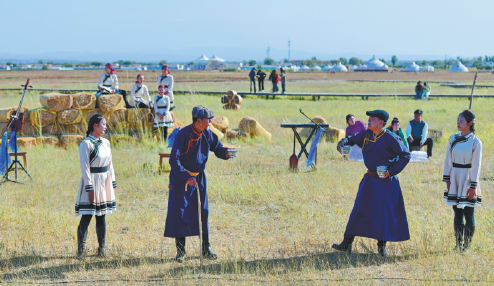

The performers travel to pastoral areas in a bus or truck loaded with their equipment. Their longest journey, to the remote Alshaa League in the far western reaches of Inner Mongolia, took an entire month.
In the 1990s, performances didn't start until after 9 pm, as herders first needed to milk their cows. Songs echoed through the night, continuing until the stroke of midnight. Passionate herders danced alongside them and some even stepped forward to join in the singing.
"They wouldn't come right out and ask for another song, but you could see it in their faces — they wanted more. The excitement would keep going until 1 in the morning," Guo says, recalling moments that touched her.
"We were once invited to stay in a yurt and cooked together with the family. It felt like a celebration, and they offered us their best food," she says.
The genuine emotions that come from connecting with the audience on such a personal level have fueled her performances with her Ulan Muqir troupe for decades.
The first Ulan Muqir troupe was formed in the Sonid Right Banner in Xiliin Gol League in 1957, with the mission of entertaining communities with limited access to cultural events. It engaged with residents, incorporating local stories and culture into its performances.
After decades of development, there are now 75 Ulan Muqir troupes in Inner Mongolia, with about 3,500 performers like Guo giving thousands of performances around the region each year, according to local government data.
Xing Lili, director of the regional-level Ulan Muqir troupe of Inner Mongolia, says that the troupe gives around 100 performances every year. Apart from entertaining herders in remote areas, the troupe has performed at local communities, nursing houses, villages and primary schools in recent years. Being mobile allows the troupe to tailor its performances to meet the demands of different groups.